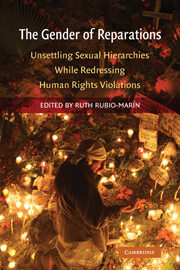Book contents
- Frontmatter
- Contents
- Acknowledgments
- Contributors
- Photo Credits: “Gender, Memorialization, and Symbolic Reparations,” in The Gender of Reparations
- International Center for Transitional Justice (ICTJ)
- Introduction: A Gender and Reparations Taxonomy
- 1 Gender and Violence in Focus: A Background for Gender Justice in Reparations
- 2 The Gender of Reparations in Transitional Societies
- 3 Reparation of Sexual and Reproductive Violence: Moving from Codification to Implementation
- 4 Reparations as a Means for Recognizing and Addressing Crimes and Grave Rights Violations against Girls and Boys during Situations of Armed Conflict and under Authoritarian and Dictatorial Regimes
- 5 Repairing Family Members: Gross Human Rights Violations and Communities of Harm
- 6 Tort Theory, Microfinance, and Gender Equality Convergent in Pecuniary Reparations
- 7 Gender, Memorialization, and Symbolic Reparations
- 8 Gender and Collective Reparations in the Aftermath of Conflict and Political Repression
- Index
- References
6 - Tort Theory, Microfinance, and Gender Equality Convergent in Pecuniary Reparations
Published online by Cambridge University Press: 25 August 2009
- Frontmatter
- Contents
- Acknowledgments
- Contributors
- Photo Credits: “Gender, Memorialization, and Symbolic Reparations,” in The Gender of Reparations
- International Center for Transitional Justice (ICTJ)
- Introduction: A Gender and Reparations Taxonomy
- 1 Gender and Violence in Focus: A Background for Gender Justice in Reparations
- 2 The Gender of Reparations in Transitional Societies
- 3 Reparation of Sexual and Reproductive Violence: Moving from Codification to Implementation
- 4 Reparations as a Means for Recognizing and Addressing Crimes and Grave Rights Violations against Girls and Boys during Situations of Armed Conflict and under Authoritarian and Dictatorial Regimes
- 5 Repairing Family Members: Gross Human Rights Violations and Communities of Harm
- 6 Tort Theory, Microfinance, and Gender Equality Convergent in Pecuniary Reparations
- 7 Gender, Memorialization, and Symbolic Reparations
- 8 Gender and Collective Reparations in the Aftermath of Conflict and Political Repression
- Index
- References
Summary
INTRODUCTION
In numerous possible contexts, national governments can start reparations programs. This chapter focuses on reparations for the effects of a crisis that ravaged a whole nation – for example civil war, genocide, dictatorship, apartheid – rather than a single, discrete deviation from the norms of a functioning democracy. Isolated incidents can generate urgent needs of repair, but the reparations under discussion in this chapter presume a more fundamental ambition: a declaration of the nation's past as broken, and its future in need of mending.
Precedents for this undertaking provide models for the subcategory of interest here, pecuniary reparations – that is, programs that seek to identify and compensate individual citizen-claimants in recognition of human rights violations that they suffered during the recent past. Such recognition can take monetary form in transfer payments to individuals. Argentina, which through legislation in 1994 appropriated reparations for victims of forced disappearances and detentions that took place from 1975 to 1983, paid in the form of bonds; Chile, which in 1992 appropriated pension funds for the victims of human rights violations that took place from 1973 to 1990; and South Africa, which disbursed cash payments totaling US $5.5 million to approximately 14,000 apartheid-era victims – these are among the countries that have distributed pecuniary reparations following national crises. In less wealthy nations, including Peru, Rwanda, Haiti, Sierra Leone, and Guatemala, units of government have expressed approval of providing monetary compensation to citizen-victims in the wake of national crises, suggesting that pecuniary reparations can hold appeal as policy in nations hard-pressed to finance a new round of transfer payments.
- Type
- Chapter
- Information
- The Gender of ReparationsUnsettling Sexual Hierarchies while Redressing Human Rights Violations, pp. 291 - 323Publisher: Cambridge University PressPrint publication year: 2009
References
- 3
- Cited by



